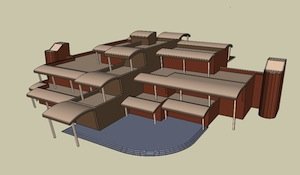Enough funding is now in hand to initiate design and building.
A campaign to build a wine science center at Washington State University Tri-Cities got a big push from the state budget that was approved in mid-April. Five million dollars included in the state capital and supplemental budget moves groundbreaking for the new center to 2013.
WSU has been working for several years to raise money for the $23.25 million three-story wine science center that would feature a gravity flow research and teaching winery, grape and wine analysis laboratory, controlled temperature rooms, filtration and bottling equipment, classrooms, and offices. The wine science center is also envisioned to include a teaching vineyard, regional and international wine library, and greenhouses.
“With the new state money, we can say we have a building,” said Carolyn Troy, senior director of development for WSU’s College of Agriculture, Human and Natural Resource Sciences. Only $2 to 3 million still needs to be raised for the building portion of the center, she notes. The building itself is estimated to cost $15.25 million. Another $7.5 to 8 million is needed for equipment.
Timeline
“Things will now start moving very rapidly,” Troy said, adding that the center is a “great happening” for the wine industry. “It’s been a great public and private partnership experience.”
Troy’s counterpart at WSU Tri-Cities, Sharon Holden, adds that 46 architectural firms submitted proposals for the preliminary design bid. WSU will select the preliminary design firm in May and allow some six months for completion of the design phase that includes assessing programmatic needs, prioritizing space requirements, and projects the costs to build the center in phases, if that is needed.
Holden explains that at the end of the six-month preliminary design step, an assessment of finances in place will be made to determine how much or if all of the project can be built. In January 2013 she expects the design/build request for proposal process to start, which will likely be a three month process before a candidate is selected. After another six months for the design phase to be completed means that the probable construction start date would be Fall of 2012.
She said the construction phase is expected to take 18 to 24 months.
“The project is a go, but we’ll have to see how much of it we can build,” Holden said.
With a timeline and tangible results at hand, the private fundraising effort is aggressively moving forward. “The fundraising efforts have been phenomenal now that the project is becoming reality and there is great momentum,” Holden said.
Improving Washington wines
The wine science center will help meet growing research and production needs by developing ways to improve wine grape production and wine quality, says Dr. Thomas Henick-Kling, director of WSU’s Viticulture and Enology program. He explained in a web video of the Northwest Wine Press that there are a host of research questions to answer, including things like, what flavors make Washington wines unique and how does industry manage those flavors and what happens to wine quality during aging so that Washington winemakers can consistently produce quality wines.
The building will be located on 3.5 acres of land adjoining WSU donated by the Port of Benton and developed by a Public Development Authority created by the city of Richland. Public development authorities are government corporations that act as a conduit for money raised privately and by industry. Pike’s Place Market in Seattle is an example of a PDA.
A major advantage to the wine science center housed at WSU’s Tri-Cities branch will be its close proximity to wine grape production, something that other university wine research facilities lack, said Henick-Kling. Neither research facilities of the University of California, Davis, nor New York’s Cornell University in Ithaca are situated in the heart of grape growing. The center’s location will allow student involvement in internships and field research projects.
He believes the center will attract international collaborating researchers and will offer faculty, researchers, and students a centralized location for teaching and research. Currently, 30 faculty are part of WSU’s viticulture and enology program doing research and extension work and are spread over two locations in Pullman and Prosser.
Grassroots support
The Washington Wine Commission has committed $7.4 million towards the wine science center, money that’s being raised through assessments on grape and wine production for the next ten years. Beginning with last year’s crop, the industry raised its per ton assessment on grapes from $10 to $12 and for wine production, from 6 to 8 cents per gallon.
Private donations to the wine center are also an important part of the fundraising efforts. Last February, the Altria Group and Ste. Michelle Wine Estates, Washington’s largest wine company, pledged $1 million to program enhancement of WSU’s viticulture and enology program. However, the money is not to be used to build the wine center.
The wine science center is part of a fundraising campaign to raise money for several wine industry needs identified several years ago by an industry research task force and needs assessment conducted by WSU. Although the wine center is a priority, other needs include endowment of professorships, completion of the viticulture and enology center at the Prosser research station, additional greenhouse facilities at Prosser and Tri-Cities, scholarships and graduate work operating funds, and ongoing research at WSU’s research vineyard.
Visit WSU wine campaign to learn more or make a contribution.


Leave A Comment